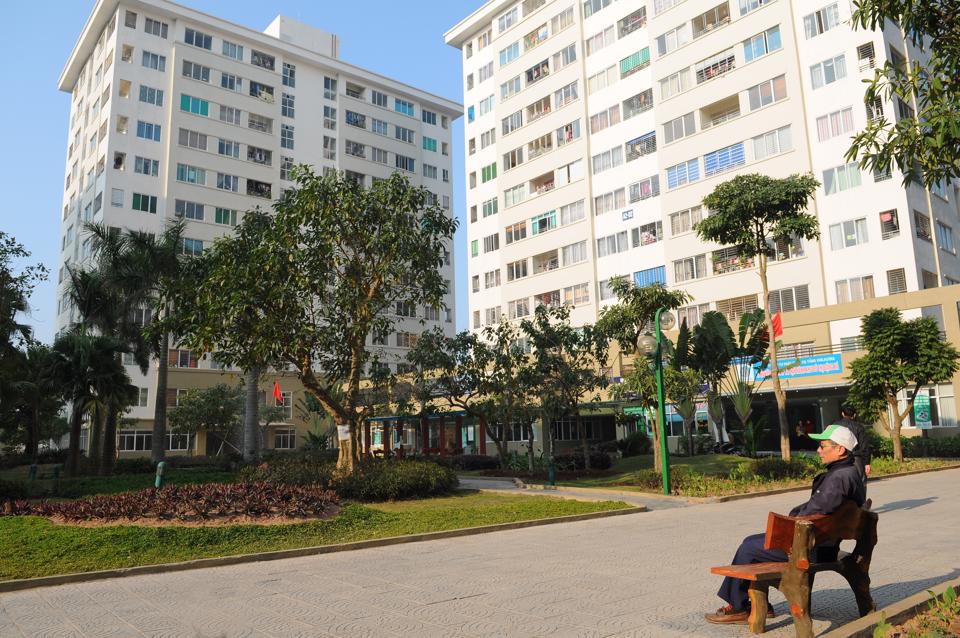Plan for one million social housing units: tackling shortage
In 2024, the Ministry of Construction will closely monitor the implementation of the plan and work with local governments to allocate land for social housing.
To meet the growing demand for housing this year, the Ministry of Construction is committed to implementing cohesive and synchronized measures to build at least one million social housing units for low-income people and workers in industrial zones from 2021 to 2030.
This determination also means overcoming a number of obstacles to address the shortage in recent times, heard a conference held in Hanoi this week.
Identifying causes
| A social housing project in Dang Xa, Gia Lam District. Photo: Mai Van/ The Hanoi Times |
On April 3, 2023, Prime Minister Pham Minh Chinh approved a plan to build at least one million social housing units for low-income people and workers in industrial zones from 2021 to 2030.
Figures from the Ministry of Construction, compiled from local reports, there are currently 495 social housing projects aimed at providing accommodation for low-income individuals and workers in industrial zones across the country. These projects are slated to yield a total of 402,898 housing units. Among these projects, 70 have been completed, resulting in 35,566 housing units. Additionally, 127 projects, comprising 107,896 units, are currently under implementation, while another 298 projects, with 259,439 units, have been approved for execution.
According to the Ministry of Construction, the progress of the plan to build one million social housing units is sluggish, despite high demand, leading to a shortage of supply. Notably, more than half of the 2021-2025 period has elapsed, yet only 4.5% of the planned housing units have been constructed.
This slow progress is attributed to numerous obstacles in the implementation process. Hoang Hai, director of the Housing and Property Management Agency under the Ministry of Construction, highlighted several barriers, including a lack of incentives for developers and lengthy land allocation procedures. Meeting the requirement that real estate development projects allocate 20% of their land for social housing is challenging, particularly in large cities where land availability is limited.
Additionally, Hai noted that the disbursement of the VND120 trillion (nearly US$4.9 billion) loan package is also slow due to many localities not having prepared lists of social housing projects. Furthermore, some developers have failed to meet the credit conditions required to secure loans.
He further mentioned that the interest rate on the loan package remains high, and the interest rate on short-term loans is not sufficiently attractive for enterprises and individuals.
Accelerated implementation
Despite being the country's leader in social housing development, Hanoi still faces a housing shortage, according to Mac Dinh Minh, deputy director of the Hanoi Department of Construction. So far, the city has issued a social housing development plan for 2021-2025, which aims to build 5.7 million square meters of floor space.
The city also aims at building five concentrated social housing areas (three in Tien Duong and Dai Mach communes, Dong Anh District; two in Co Bi Commune, Gia Lam District, and Ngoc Hoi Commune, Thanh Tri District), which are expected to add about 2.5 million square meters to the social housing fund.
To expedite these plans, the Ministry of Construction has urged the Hanoi Department of Construction to review approved projects and those under construction to ensure their feasibility in 2024.
At the national level, Minister of Construction Nguyen Thanh Nghi is optimistic that meeting the 2025 targets is feasible if social housing projects are completed on schedule.
He emphasized the need for the State Bank of Vietnam (SBV) to actively participate and implement the loan package worth nearly US$4.9 billion. The ministry will enhance collaboration with the SBV to expedite investment progress in social housing projects and ensure timely disbursement of this loan package.
Deputy Minister of Construction Nguyen Van Sinh stated that the ministry will examine and propose enhancements to the legal framework concerning housing, including a decree on the development and management of social housing, elaborating on the provisions of the 2023 Law on Housing. This initiative aims to address obstacles related to mechanisms, policies, and laws, fostering the growth of social housing and accommodation for workers in industrial zones.
In 2024, the ministry will closely monitor the plan's implementation and collaborate with local authorities to inspect land allocation for social housing, Sinh emphasized.













